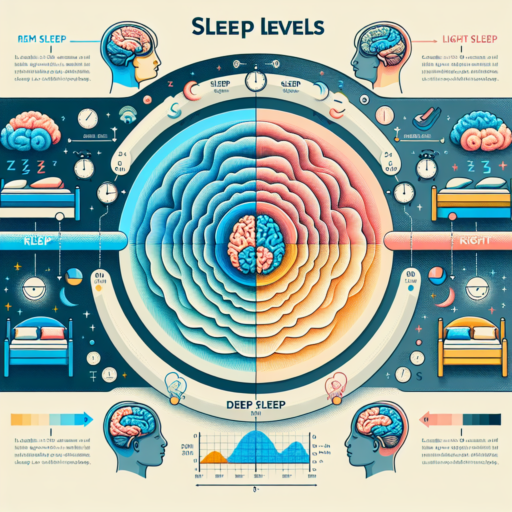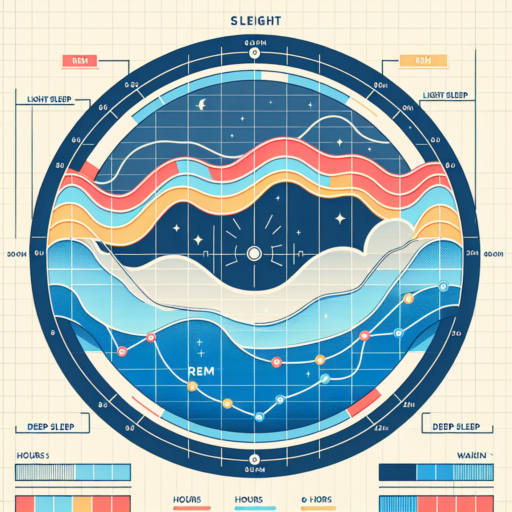What are the 5 levels of sleep?
Understanding the 5 levels of sleep is crucial for recognizing the complexity of our sleep patterns and how they impact our health. These levels are divided into two main categories: Non-REM (Rapid Eye Movement) and REM sleep. Each stage plays a vital role in ensuring that our brain and body function optimally, rejuvenating us for the next day.
The first four stages are classified under Non-REM sleep, each characterized by deeper levels of sleep and distinct physiological responses in the body. The fifth stage, known as REM sleep, is where most dreaming occurs and has been linked to memory consolidation and mood regulation. It’s noteworthy that our sleep cycle progresses through these stages multiple times throughout the night, with each cycle lasting about 90 to 110 minutes.
Starting with Stage 1, a light sleep where one can be easily awakened, to Stage 2, where sleep deepens and the body begins to disengage from its surroundings, the journey through the night’s rest illustrates the body’s remarkable ability to heal and restore itself. Stage 3 and Stage 4 represent even deeper sleep levels, crucial for physical recovery and health. Transitioning into REM sleep, the body experiences an almost paralyzed state, yet the brain remains highly active, processing emotions, memories, and stress. It’s this intricate dance of stages that underscores the necessity of a good night’s sleep for overall wellbeing.
What should your sleep levels be?
Understanding the optimal sleep levels is crucial for maintaining a healthy lifestyle. According to the National Sleep Foundation, adults require between 7 and 9 hours of sleep per night. However, it is essential to recognize that individual needs may vary. Factors such as age, lifestyle, and general health can significantly influence the amount of sleep you should ideally get.
Age-related Sleep Recommendations
- Children (6-13 years): 9-11 hours
- Teenagers (14-17 years): 8-10 hours
- Young adults (18-25 years): 7-9 hours
- Adults (26-64 years): 7-9 hours
- Older adults (65+ years): 7-8 hours
Aside from quantity, the quality of sleep is equally important. Ensuring that you’re not only getting enough hours but also uninterrupted, restful sleep is key. Factors that can affect sleep quality include your sleeping environment, electronic device use before bed, and stress levels.
Listening to your body’s needs and making adjustments can improve your sleep quality and overall health. For those experiencing consistent sleep difficulties, consulting with a healthcare professional is advised to rule out sleep disorders or other health issues. Remember, prioritizing sleep is a step towards enhancing your well-being.
No se han encontrado productos.
What is REM vs deep sleep?
Understanding the difference between REM sleep and deep sleep is crucial for recognizing the various stages our bodies go through to achieve restorative rest. REM, which stands for Rapid Eye Movement, is distinct from deep sleep in several key ways that impact our overall health and daily performance. During REM sleep, our brains are almost as active as they are while awake, which is why most of our dreaming occurs in this stage. On the other hand, deep sleep is the stage of sleep that allows for the most physical recovery and restoration.
One of the primary distinctions between REM sleep and deep sleep lies in their roles in cognitive and physical health. REM sleep is essential for cognitive functions such as memory consolidation, learning, and emotional processing. This phase helps the brain make sense of the information it has received during the day. In contrast, deep sleep, which is characterized by slow brain waves known as delta waves, is critical for physical health; it’s when the body repairs tissue, strengthens the immune system, and regenerates cells.
The cycle of sleep stages, including REM and deep sleep, repeats several times throughout the night. Typically, deep sleep dominates earlier in the night, while REM periods lengthen towards the morning. This cycle suggests a sophisticated balance between the body’s need for both physical restoration and cognitive maintenance. Acknowledging the unique roles of REM and deep sleep stages not only underscores the complexity of human sleep patterns but also highlights the importance of a balanced sleep schedule for overall well-being.
How many hours of REM sleep do you need?
Understanding the importance of REM (Rapid Eye Movement) sleep is crucial for recognizing its role in our daily restorative processes. The question of how many hours of REM sleep you need is not just a matter of curiosity but a vital aspect of maintaining overall health and wellbeing. Typically, adults should aim for a sleep cycle that allows for approximately 20-25% of their sleep time in the REM stage. Given that the average adult sleeps about 7 to 9 hours per night, this translates to roughly 1.5 to 2.25 hours of REM sleep.
During REM sleep, your body undergoes significant physiological changes, including increased brain activity, accelerated respiration, and eye movement, which are crucial for cognitive functions such as memory consolidation and mood regulation. The exact amount of REM sleep can vary widely among different individuals. Factors such as age, lifestyle, and overall health significantly influence one’s REM sleep needs. For instance, newborns spend almost 50% of their sleep in the REM phase, which is essential for brain development.
Furthermore, the distribution of REM sleep throughout the night is not uniform. Early sleep cycles may have shorter REM stages, with the duration increasing in later cycles. Therefore, disrupting your sleep pattern or cutting sleep short can dramatically reduce the amount of REM sleep you get, potentially affecting memory skills and emotional health. Ensuring a regular sleep schedule and avoiding stimulants before bedtime can help in maximizing the benefits of REM sleep and achieving the recommended hours.



